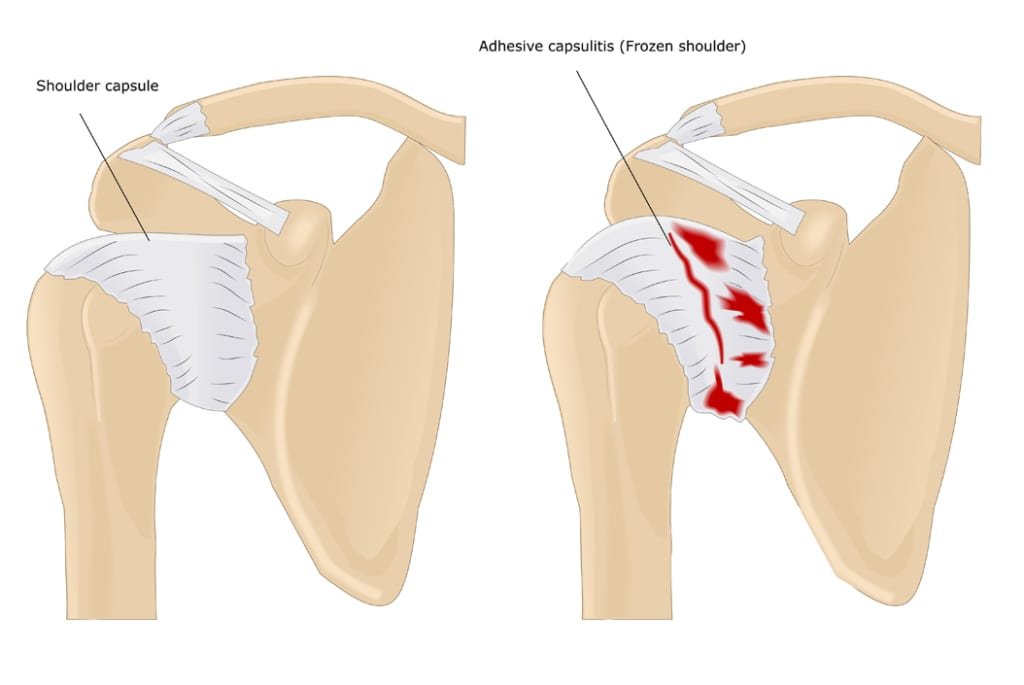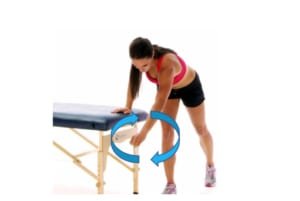If you have a Frozen Shoulder and would like to see a specialist, call now or book online.
What is a frozen shoulder?
Frozen shoulder is also known as adhesive capsulitis and is when the capsule (the membrane or sac) around the shoulder joint gets inflamed and contracted.
Frozen shoulder pain can be excruciating and very debilitating, and can have a significant impact on your quality of life. It is a common cause of shoulder pain and stiffness, particularly in those aged between 40 and 60 and is more common in women and those with diabetes

What are the stages of Frozen Shoulder?
It is well documented that frozen shoulder has three distinct stages.
Frozen Shoulder Treatment Stage 1:
‘Freezing or painful stage’. Your shoulder pain will gradually increase, particularly at night and your shoulder becomes restricted. This stage can last 6 weeks to 9 months.
Frozen Shoulder Treatment Stage 2:
‘Frozen or stiff stage’. Your shoulder pain begins to improve but you notice your shoulder is stiff. It often lasts between 6 and 9 months.
Frozen Shoulder Treatment Stage 3:
‘Unfreezing or thawing stage’. Your shoulder movement becomes easier, the pain is significantly reduced, and you are able to return to normal activities. This stage can last between 6 months and 2 years.
Why do people get frozen shoulder?
The exact cause of frozen shoulder is unknown.
Sometimes you can develop the condition following a fall, a stroke or after a shoulder operation. However, most of the time it develops for no apparent reason.
How do you diagnose frozen shoulder?
Frozen shoulder is a “clinical diagnosis” which means that your physiotherapist can diagnose it during your initial assessment.
The term ‘frozen shoulder’ means that the joint is restricted in specific directions. This is known as the ‘capsular pattern’.
A capsular pattern is when your joint is restricted into lateral rotation (when your elbow is tucked into your side and you move your hand away from you), abduction (moving your arm out to the side), and medial rotation (putting your hand behind your back). Most patients suffering from frozen shoulder pain and stiffness have difficulty putting on a bra, washing and combing their hair and reaching up to cupboards.
X-rays, MRI’s and diagnostic ultrasound scans can be useful in ruling out other reasons for your pain. At Complete we have highly specialised physiotherapists who are trained in diagnostic ultrasound and will be able to carry out a scan of your shoulder. Ultrasound is excellent at looking for a rotator cuff tear which is another common cause of shoulder pain.
What can you do to help a frozen shoulder?
The recommended frozen shoulder treatment depends on the stage of the condition.
Frozen Shoulder Therapies and Medical Treatment
Stage 1 – Frozen Shoulder Pain Management
During stage 1, the shoulder is normally very painful, you cannot carry out basic tasks and you struggle to get a good night’s sleep due to the pain. If this is the case, the main aim of your treatment should be pain relief. This may include medication, rest from the movements and activities that cause you pain and physiotherapy for symptomatic relief. Gentle exercises such as pendular exercises can also help to ease the pain. To carry out a pendular exercise you should rest your other hand on a table, lean forward and gently rotate your painful arm in circles (see below). If this makes your pain worse, you should stop and consult a physiotherapist.

If your pain is not improving with treatment or the pain is waking you up at night, then an ultrasound-guided injection should be considered. During the painful stage, an ultrasound-guided injection is well evidenced in medical research and often results in an improvement in pain, particularly at night. We would always advise an injection is carried out with ultrasound guidance to ensure the accuracy and effectiveness of the intervention.
Following an injection, it is always recommended that you complete a course of physiotherapy to gain further improvements in pain, range of movement and to start restoring strength in the arm.
Stage 2 – Increasing Mobility
During stage 2 and 3 when the shoulder is less painful but still has reduced mobility, physiotherapy can be very effective on its own.
Keep the shoulder moving as much as the pain allows
Stop and consult your physiotherapist if your stretches increase your pain significantly
Consult your GP for pain relief and if you are struggling to sleep, consider having an ultrasound-guided steroid injection.
Try and push through the pain – especially in stage 1 (painful stage)
Continue doing tasks or activities that cause or increase your pain
Suffer in silence. We are here to help!
If you are experiencing any of these symptoms, have been diagnosed with frozen shoulder and would like to see one of our expert physiotherapists you can call 020 3869 5307 or email info@complete-physio.co.uk. If you would like to speak to a specialist before booking, then please send us an email with your details and we will call you back.
Don’t let pain hold you back, book now!

